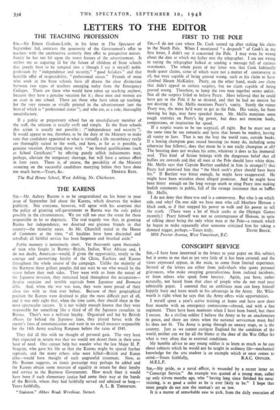CONSCRIPT SERVICE
Sta,—I have been interested in the letters to your paper on this subject, but it seems to me that as yet very little of it has been covered, and the views expressed appear, in the main, to come from limited experience. Several of the letters are either from individuals who quote personal grievances, who make sweeping generalisations from isolated incidents, or from others who speak from hearsay. Again, you have, rather naturally, not heard from that class of people who do not read your admirable paper. I contend that an ambitious man can keep himself happily busy and learn much to his advantage in the Army. Mr. Whit- worth is right when he says that the Army offers wide opportunities.
I myself spent a year's active training at home and have now done four months with an emergency commission—abroad, and with a fine regiment. There have been moments when I have been bored, but these I excuse. As a civilian soldier I believe the Army to be an anachronism in peace, and there are times when the national serviceman must find he does not fit. The Army is going through an uneasy stage, as is the country. just as we cannot castigate England for the condition of the world, neither can we lay all the blame at the door of the War Office for what is very often due to external conditions.
My humble advice to any young soldier is to learn as much as he can about subjects which he would not be taught in ordinary life—mechanical knowledge for the arts student is an example which at once comes to


































 Previous page
Previous page